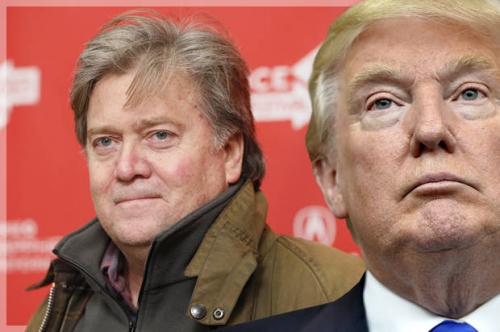mercredi, 19 avril 2017
If Trump Loses Bannon, Trump Loses the Presidency

If Trump Loses Bannon, Trump Loses the Presidency
I bet big on Donald Trump in the 2016 elections, rather famously. Now I will be shorting Trump stock for the foreseeable future until Bannon, and Bannon-ism, returns to policy dominance in the White House.
Should Trump ever lose Bannon entirely, Trump is a lame duck. Some media suggest that Trump could replace Bannon with Jared Kushner. Jared Kushner is to Steve Bannon what Dan Quayle was to JFK.
Bannon – uniquely among the Trump team – threads together the policy weaves of the Trump electoral majority, a majority dependent upon newfound GOP support from the working class, especially in the northern half of the country, but also the southern upcountry and Appalachia.
Three issues allowed Trump to distinguish himself, both in the GOP primaries and in the general election, to appeal to these GOP skeptic voting constituencies:
- No preachy politics. These voters want neither Southern Baptists nor Hollywood celebrities lecturing them about morality nonstop. They generally take a more libertine approach on marijuana, especially amongst the younger cohorts in this constituency. (Many of these communities were moonshine communities back in the day, especially the Appalachian communities. You will find a not too surprising overlap between marijuana and moonshine communities historically.) The Appalachian communities and their kindred constituencies cast decisive votes in more places than West Virginia, Tennessee, Indiana, and Kentucky. Appalachia dips into Pennsylvania and Ohio, helped make Virginia competitive, tipped the balance in North Carolina, and shares a lot in common in political mindset with places like the Minnesotan Iron Range, the northern woods of Wisconsin, the peninsula of Michigan, and the countryside of Iowa. They are often Christian but more likely to be Saturday party-goers than Sunday church-goers.
- No more dumb war. Voters from the ancestral regions of the Union draftees after the Civil War – from northern Maine to the Minnesota Iron Range – have, ever since, instinctively viewed war with suspicion. Study the voting patterns of this kind of county, and you will find that sudden surges turn out to oppose various wars. The heart of "isolationism" was a Midwestern phenomenon in the same regions that tilted so heavily toward Trump in the election. It is not a coincidence that areas with historic antiwar tendencies – from east Tennessee to western Wisconsin, from rural Iowa to northern Maine – were some of the biggest pro-Trump trending areas in the country, nor that two states that formed the heart of antiwar politicians in the past (like Ohio's Taft) bolted so heavily toward Trump. Trump used his war-skeptical views to outflank the war-loving Hillary on both the working-class left and right, giving him the keys to his electoral majority, heisting Bernie primary voters along the way. Betray this group with another Mideast war, and Trump endangers his electoral majority permanently. That is where Bannon's inclusion in national security decisions remained critical for Trump's own political future.
- No more job-killing deals. The global-focused economy of finance and real estate enriched the urban port cities at the expense of the rural- and middle-America small-town heartland, who make our food and make our products. Trump, despite profiting from that largely coastal port-city world, promised to reverse that economic bargain. Trade, immigration, and infrastructure all allowed him to carve out distinguishing traits, while also promising a protective government that does not over-rely on regulatory bureaucracy in areas of health, education, and energy. Tax reform took its role, as did Obamacare reversal, but it all fit into a different fabric of policy ideals from traditional Republican economics, meant to appeal to a GOP-skeptic northern working class rightly skeptical of Ryan economics and McCain foreign policy.
Bannon understands, intricately, each of these issues and, as important, the intimate way each of these issues connects the new constituencies of the Trump electoral majority. Bannon also understands the adversary – an alliance of Deep-State, administrative-regulatory-state, professional-class career bureaucrats and their media lapdogs and allies. Bannon also enjoys another unique attribute: actually overcoming them, in the public area of persuasion (the extraordinary rise of Breitbart against a media blackout of the site) and the electoral arena of actual elections (feeding the Tea Party, then fueling Trumpism).
Bannon politically is to Trump what Carville was to Clinton, Atwater was to Poppy Bush, and Kevin Phillips was to Nixon, but he also enjoys a consigliere-type skill set for actual policy that gives strategic substance to Trump's gut-driven, emotive decision-making. Trump's instinctive ingenuity and persuasive mastery cannot substitute for Bannon's integration of policies and constituencies in actually governing.
Kushner's apparent deference to the war-mongering elements of the national-security establishment and the bank-adoring financiers of Wall Street reveals that he suffers from the same delusional understanding of politics and policy that got the GOP so hated by its own base over the last half-decade. Kushner looks to the approval of Goldman Sachs; Bannon looks to the approval of those who hate Goldman Sachs.
Lose Bannon, lose the country. Lose Bannon, lose the presidency. Trump needs to bet on Bannon, or it will be time to no longer bet on Trump.
Read more: http://www.americanthinker.com/articles/2017/04/if_trump_...
Follow us: @AmericanThinker on Twitter | AmericanThinker on Facebook
20:03 Publié dans Actualité | Lien permanent | Commentaires (0) | Tags : donald trump, steve bannon, altright, états-unis, actualité, alternative right |  |
|  del.icio.us |
del.icio.us |  |
|  Digg |
Digg | ![]() Facebook
Facebook



Les commentaires sont fermés.